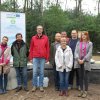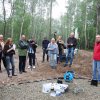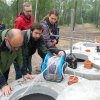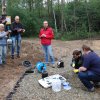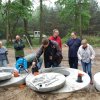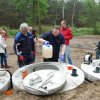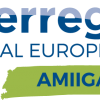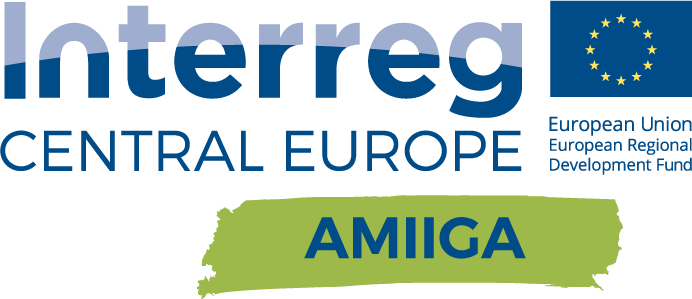
The 16th of May, 2018, saw the beginning of the operational activity of a bio-reactive barrier located in Jaworzno, installed to purify groundwater of pollutants.
A microbiological “vaccine” was introduced yesterday for the first time into the barrier pilot plant, which had been built as part of the international project bearing the acronym AMIIGA: Integrated Approach to the Management of Groundwater Quality in Functional Urban Areas. The Central Mining Institute is the leader of the consortium, while the project itself is co-financed by the European Union with funds from the European Regional Development Fund as part of the Interreg CENTRAL EUROPE programme for 2014-2020.
As part of the project, 7 pilot actions will be realised in 7 different regions of Central Europe. In Poland, the pilot action is the innovative bio-reactive barrier tested in the area of Jaworzno. The barrier is located in the vicinity of Chemical Works “Organika Azot” S.A. at the groundwater downflow from a polluted area known as the “old waste dump by the railway track”. The accomplishment of this pilot action will make it possible to test the efficiency of the designed reactive barrier system for the entire polluted area in the Wąwolnica stream valley. A direct result of this will be the improvement of groundwater quality.
The bio-barrier is meant to purify groundwater of substances such as HCH, DDT, dieldrin or endrin pesticides, and also to limit their dissemination in the environment. There are enormous amounts of pollutants such as hydrocarbons or organochlorine pesticides gathered in the old waste dumps of Chemical Works “Organika Azot” in Jaworzno, and they belong to the most persistent pollutants present in the natural environment.
On the 16th of May this year, bacterial strains tested and selected by scientists from the University of Silesia and capable of decomposing pollutants present in a given area were introduced into the barrier. The operational efficiency of the bio-barrier will be tested for the next few months, as according to the established monitoring plan.
The AMIIGA project brings 12 partners together from 6 European Union countries. Project participants include: The Central Mining Institute (project Lead Partner), the city of Jaworzno (Poland), the city of Novy Bydzov (Czechia), the Technical University of Liberec (Czechia), the city of Stuttgart (Germany), the Lombardy region (Italy), the city of Parma (Italy), the Polytechnic University of Milan (Italy), the Geological Survey of Slovenia (Slovenia), JP VODOVOD - Ljubljana Waterworks and Sewerage Company (Slovenia), the University of Zagreb (Croatia) and VODOVOD Zadar – Water Supply Company (Croatia).
Its main objective is to improve the process of management and decision making concerning polluted groundwater at the functional urban area (FUA) scale. As part of the project, an innovative “groundwater management operational plan” will be established, as well as new biological methods of remediation serving as support tools for decision making and sustainable planning in functional urban areas.

